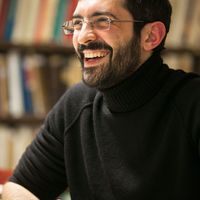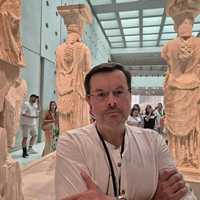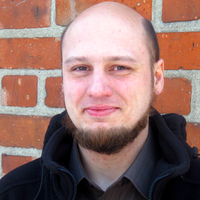
Anton Alvar
I am a Greco-Roman scholar with over twelve years of scholarly preparation, multiple peer-reviewed book chapters and articles, and a recent monograph (Cadenas invisibles. Los usos de la magia entre los esclavos en el Imperio romano, Besançon, Presses Universitaires de Franche-Comté, 2017). My education commenced at the Complutense University (Madrid) where I graduated with a Bachelor of Humanities degree in History in 2004. As high-achieving undergraduate, I participated actively in seminars, conferences, and courses organized in several research centres. My doctoral studies focused on the study of Greco-Roman religion with specialties in comparative religious studies and the practice of magic in the Ancient world, both of which are recognized as vibrant and critical areas of research since the later part of the twentieth century in the field of Ancient Religions. Thoroughly engaged with both the historiography and scholarship of these fields, I have advanced my own research projects into the study of semi-institutionalized religious practices, which culminated in my dissertation on the Ancient Roman beliefs pertaining to the Evil Eye. I successfully revised my dissertation into a published monograph in 2012, which has since been reprinted in 2014 due to the impact of the text. Simultaneously, I have authored ten articles in international peer-reviewed journals (including Numen, Dialogues d'Histoire Ancienne and Archiv für Religionsgeschichte among others), published ten book chapters, prepared a forthcoming monograph in Dialogues d'Histoire Ancienne's supplements, edited a volume of essays that received rave reviewed by Bryn Mawr Classical Review, and organized and participated in numerous international workshops, conferences and seminars.
less
Related Authors
Nuno Simões Rodrigues
University of Lisbon
Francesco Camia
Università degli Studi "La Sapienza" di Roma
Dafni Maikidou-Poutrino
Aristotle University of Thessaloniki
Enrique Meseth
Universidad Peruana Cayetano Heredia
Jean-Marc Deom
Kazakh national university named after al-Farabi
Kamil Stachowski
Jagiellonian University
Catherine Wolff
University of Avignon
Vassilis Tsiolis / Βασίλης Τσιώλης
University of Castilla-La Mancha
Rebeca Rubio Rivera
University of Castilla-La Mancha
InterestsView All (33)










Uploads
Papers by Anton Alvar
figure of the procuress Dipsas almost a century earlier, Ovid created a synecdoche for moral disorder at Rome itself shortly before the two Augustan laws of 18 b.c.e. regulating
sexual conduct. In short, if we are to progress in our understanding of Roman socio-moral instrumentalization of ocular malformation in relation to the evil eye, we must pay careful attention to the contexts and strategies of our texts.
Conference Presentations by Anton Alvar
The conference aims at analysing how self-experience of religious communication becomes a reflexive phenomenon reproduced in time and space to constitute a collectively shared narrative. While human agency has been a paramount concept in recent scholarship of religions in the classical world, the conference organizers invite the participants to direct their attention to the processes of social reproduction that validate individual experience. On the one hand, though human agency (understood as accountable action) is a useful heuristic category for functionalist thought, it tends to evade the temporal dimension, as it mostly highlights a specific action set in a particular moment and place. On the other hand, a diachronic analysis of religious phenomena creates the illusion of a linear, sequential process of progressive ‘movements’. Following Anthony Giddens’ remarks on the importance of embedding social systems in time and space, the success of social action is found in its subsequent replication over time, modelling routinised actions. The issues to be addressed during the conference should investigate how individual, creative religious micro-strategies of communication with the gods became established patterns of behaviour, to what extent individual behaviour was mediated by cultural constraints, or why individual biographies of divine experience became exempla and identity markers.
Le Groupe international de recherches sur l'Esclavage depuis l'Antiquité (G.I.R.E.A.), fondé en 1970, est un réseau international auquel ont participé depuis son origine jusqu'à aujourd'hui plus de 400 chercheurs, promouvant l'étude de l'esclavage dans une perspective critique, analytique et transculturelle. Les chercheurs désirant participer à la XXXVIIIe édition de son colloque sont invités à envoyer une proposition sur le thème suivant : « Historiographie de l'esclavage ». Le colloque aura lieu à l'Université Carlos III de Madrid du 6 au 8 octobre 2016. Les communications seront de 20 minutes et pourront être en anglais, italien, allemand, espagnol, français et portugais. Les propositions devront présenter un résumé de 300 mots et seront envoyées à l'adresse suivante : aalvar@hum.uc3m.es. La date limite d'envoi sera le 30 mars 2016.
Talks by Anton Alvar
Books by Anton Alvar
figure of the procuress Dipsas almost a century earlier, Ovid created a synecdoche for moral disorder at Rome itself shortly before the two Augustan laws of 18 b.c.e. regulating
sexual conduct. In short, if we are to progress in our understanding of Roman socio-moral instrumentalization of ocular malformation in relation to the evil eye, we must pay careful attention to the contexts and strategies of our texts.
The conference aims at analysing how self-experience of religious communication becomes a reflexive phenomenon reproduced in time and space to constitute a collectively shared narrative. While human agency has been a paramount concept in recent scholarship of religions in the classical world, the conference organizers invite the participants to direct their attention to the processes of social reproduction that validate individual experience. On the one hand, though human agency (understood as accountable action) is a useful heuristic category for functionalist thought, it tends to evade the temporal dimension, as it mostly highlights a specific action set in a particular moment and place. On the other hand, a diachronic analysis of religious phenomena creates the illusion of a linear, sequential process of progressive ‘movements’. Following Anthony Giddens’ remarks on the importance of embedding social systems in time and space, the success of social action is found in its subsequent replication over time, modelling routinised actions. The issues to be addressed during the conference should investigate how individual, creative religious micro-strategies of communication with the gods became established patterns of behaviour, to what extent individual behaviour was mediated by cultural constraints, or why individual biographies of divine experience became exempla and identity markers.
Le Groupe international de recherches sur l'Esclavage depuis l'Antiquité (G.I.R.E.A.), fondé en 1970, est un réseau international auquel ont participé depuis son origine jusqu'à aujourd'hui plus de 400 chercheurs, promouvant l'étude de l'esclavage dans une perspective critique, analytique et transculturelle. Les chercheurs désirant participer à la XXXVIIIe édition de son colloque sont invités à envoyer une proposition sur le thème suivant : « Historiographie de l'esclavage ». Le colloque aura lieu à l'Université Carlos III de Madrid du 6 au 8 octobre 2016. Les communications seront de 20 minutes et pourront être en anglais, italien, allemand, espagnol, français et portugais. Les propositions devront présenter un résumé de 300 mots et seront envoyées à l'adresse suivante : aalvar@hum.uc3m.es. La date limite d'envoi sera le 30 mars 2016.
Cet ouvrage s'attache à comprendre le rôle et les usages de la magie au quotidien par les esclaves dans le monde romain antique. Le livre porte une attention particulière à l'usage de la magie dans les relations interpersonnelles. L'ouvrage s'appuie sur une lecture méthodologique des textes magiques qui tient compte des apports de diverses disciplines des sciences humaines dont la sociologie, l'anthropologie, les sciences des religions. .